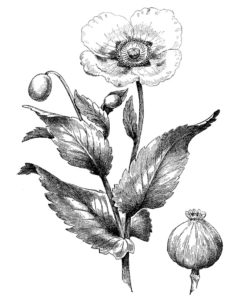Preview – An Exchange of Two Flowers
Two men, two empires and the shape of the world…
Here’s a first look at this story of the first clash between the United Kingdom and the Central Kingdom and the two men who held the future in their hands.
Be sure to sign up for my newsletter and get announcements about each chapter release, behind-the-scenes looks at the history, and sneak peeks at what’s coming next.
PART ONE – THE OPENING SALVO
March 9, 1839
The Foreigners Factories
Canton, Guangdong Province, China
I.
“Superintendant!” Emile Johnston burst into Elliot’s dim office. “You’re needed!”
Charles Elliot set down his mug of tea and frowned at his second-in-command. He’d drawn the bamboo windowshade in a vain attempt to shut out the day’s heat, but even in the dim light he saw his deputy’s face was badly flushed.
“What’s happening, Johnston?”
“I don’t know…I…there’s soldiers massing on the riverbank.”
“Slow down and speak sense!” Elliot had not commanded a ship in years, but when his patience ran short, he still reverted to a captain’s bellow.
Johnston gulped, and tried to obey. “Soldiers,” he gasped. “I think the Governor-General’s. At least two dozen, marching up the river bank toward the square.”
Elliot jumped to his feet, pushed past Johnston, barreled through his clerk’s front office and tore open the door to what was laughably called the “lane.” Little more than an alleyway, it was crowded at the best of times. Just now, it was a solid wall of backs and shoulders.
“Make way!” Elliot roared. “Shift, damn you!”
But it was no good. The mass of Europeans, Americans and Chinese were packed so tight, they couldn’t have moved aside, even if they wanted to.
Damn. Had some fool, or, worse, some official closed the gates?
Foreignerers wishing to trade in Canton were obliged to do so at the “foreigner’s factories.” Despite the name, these were not manufacturing sites. Nothing was made there. The name had been taken from the old word “factors,” meaning a counting house. The Chinese alloted each outside nation exactly one building, one “factory.” This was expected to serve as a combination of warehouse, trading depot, hostelry and clerks’ office.
In Canton, the factories were all crammed into a single row on the Pearl River’s bank like books on a shelf, and fenced off from the rest of the city by means of a stout stone wall.
This arrangement made sense only once one understood the cramped quarter had not been designed to facilitate the free flow of goods or persons. Quite the opposite, in fact. Its whole purpose was to constrain and isolate the foreigners as much as possible.
And turn us into sitting ducks.
Elliot craned his neck to try to see over the crowd, but it was useless. Cursing, he grabbed at the nearest man — a slender Chinese in blue tunic and black cap and wrenched him around.
“What’s happening?” Elliot bawled.
“Soldiers!” stammered the man, in the trader’s pidgin. “Many, many soldiers!”
“Hey! That’s the superintendent!” shouted an English voice.
Damn. Someone had recognized him, or his uniform. Elliot released the man he’d been holding. The fellow immediately set about trying to squeeze himself through the crowd.
“Captain Elliot! Oi!” A fresh shout rose up. “What’s happening, Captain?”
The question was echoed up and down the lane by dozens of English voices. Elliot stared at the crowd. How the hell could he answer?
Retreat was the only option. He slammed the door.
“Out through the yard.” He shouldered past Johnston, cutting back through his offices. “We need to get to the veranda, get above this.”
“But shouldn’t we…?”
“We should find out what the hell is going on!”
With his deputy at his heels, Elliot strode down the British factory building’s interior hallway, past store rooms, record rooms, sleeping quarters. All the while, the question from the alley rang in his ears.
What’s happening?
It could be anything. That was what squeezed the breath out of Elliot’s lungs. They were trapped in this single row of buildings. If the gates to the city were closed, there was no way easy out except along a river clogged with junks and sampans. The Chinese water forces might look like a joke beside the British navy, but their gun boats cruised the river, and the nearest English ship of the line was anchored a day away at Macao.
And the soldiers were marching up the river bank.
If the Emperor had finally had enough…if he’d ordered this new man he was sending to take serious action against the foreigners who flouted Chinese law…
Because whatever might be happening, there was no question at all as to what caused it. It was the same thing that had dogged Elliot ever since he’d agreed to accept the post of Superintendent of Trade at Canton.
Opium.
The drug was China’s nightmare, and a thorn in Elliot’s side the size of an officer’s dress sword. According to British law, it was perfectly legal to buy the stuff in whatever quantity one wished. It was also perfectly legal to sell it for whatever price one could get, to whomever would buy.
Among the Chinese however, this same transaction was highly, lethally illegal. And, it just so happened, the men who had their hands on the spigot of the opium traffic along China’s coast were right here in the factories.
The British factory building was the only one large enough to have an interior courtyard. Elliot cut directly across the shadowed yard, and stormed back inside through the opposite entrance. Johnston panted behind him.
“Maybe next time you’ll get some useful information before you come running to mummy!” Elliot growled as they strode through the larger clerks’ office. Men milled about, jabbering in English, Parsee, Hindu and pidgin.
“Superintendent!” they called. “Sir!”
“Back to your desks!” he barked. “All of you! Back to work!”
Deputy Johnston said he counted at least two dozen soldiers. The man in the alley said many-many. Two dozen was not enough for an assault. But what if there were more on the way?
What are their orders?
Have they closed the gates?
Elliot’s mind raced between those questions and trying to enumerate the contents of the gun-room, even though he knew that to be pointless. If Canton’s Governor and Governor-General were about to launch an attack on the foreigners, there would not be enough.
Soldiers massing outside. Why outside? Why not come in here?
Why no notice?
If his years in Canton had taught Charles Elliot one thing, it was that the Chinese were dedicated to procedure. No matter what their government planned, all action was proceded by a precisely written declaration, with the placement of each character dictated by custom and precedence. The British traders, and some of his fellow officials, dismissed the endless stream of paper as trivial twitterings. Elliot did not. Those notices, letters and petitions were the key to what others were pleased to call the mystery of China.
There is no mystery. Just ships and offices filled with fools who can’t find their arses with both hands, no matter how many times you show them where to look.
There should have been a letter, a posting, a warning, something. It should have come straight from the Governor, or from this new man they had on the way — what was his name? Lin? Yes. High Commissioner Lin Zexu.
Word of High Commissioner Lin’s coming had sent a ripple through the Chinese merchant families, the “Cohong” as they were called. The Cohong said this Commissioner Lin was being sent to deal with “the foreign trade.” That meant that Lin, like the man before him, and the man before him, was being sent to try to stop the opium smuggling.
But this can’t be his doing.
A high commissioner from the Celestial Court would not begin his work by breaking with tradition and procedure.
Would he?



